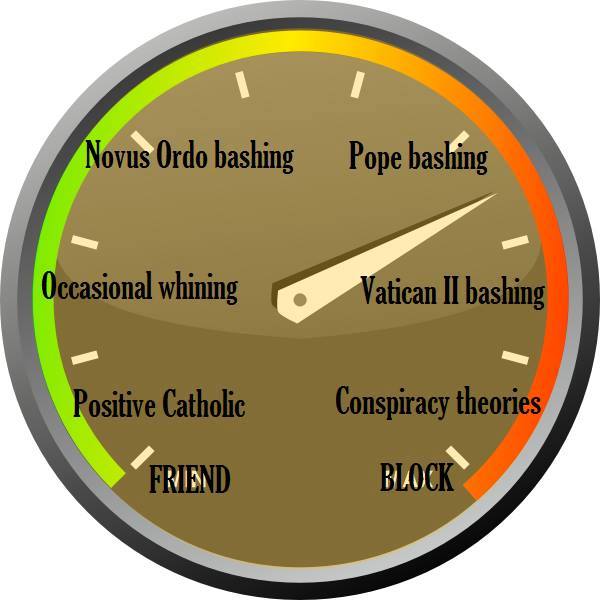
[the following is a bit disjointed because it is an initial post (originally on Facebook), followed by various replies of mine in response to comments]
***
I would say that the difference between the liberal / nominal / feminist / pro-abort Catholic and the radical Catholic reactionary is that the latter knows much better than to believe as they do. They are usually orthodox Catholics, for the most part, but they have become embittered and start thinking they know more than everyone else. This is the sin of pride and lack of charity, which leads ultimately to schism. Jesus reserved His most angry denunciations for those who were hypocrites and filled with spiritual pride (many of the Pharisees).
It’s like the ancient Donatists or Montanists. They were too good to remain with all those “ordinary, sinful” Catholics. People like this cause further division and their mentality spreads like a cancer or a poison. This is why it is necessary to ultimately separate from them in extreme cases of obstinacy, as Paul and Jesus urge in many passages in the Bible (which on Facebook means blocking).
I am arguing based on the premise of “to whom much is given, much is required.” The reactionaries, even though orthodox, still fall into these serious errors and spread the quasi-schismatic poison and cancer.
The liberal Catholic, on the other hand, is usually abysmally ignorant about the faith. Or else they have put being politically / theologically liberal above adherence to God and the Catholic faith (which is idolatry). They wrongly think that the Church is something that it is not. But the radical Catholic reactionary comes to “know” what [he falsely thinks] the Church is, and in effect tries to change it into his image, which is a far greater sin than what the liberal does.
The reactionary should, for example, know and understand that the Church is indefectible (cannot fall away from the faith). Yet their rhetoric betrays a shortsighted, faith-challenged view that the Church is supposedly at death’s door: which I have called “quasi-defectibility”.
The game (as I have noted for years) is to go as far as we can in criticizing and bashing both the ordinary form Mass and Vatican II without denying their validity. This is actually part and parcel of what I characterize as radical Catholic reactionary. It’s not yet schismatic; it remains Catholic, but plays with the edges, within a faux-legalistic, quasi-pharisaical mindset.
It’s a matter of slow degree and fine gradations. Also, it is characterized by the vehemence and frequency with which is it is done: almost an obsessive-type behavior. All that seems to matter to the reactionary is to bash bash bash and whine and moan and run down. “Measuring mint and cumin and ignoring the weightier elements” of Christianity: love, justice, and mercy. This is unbalanced and not what God intended for the devout Catholic to do and to be like.
I am arguing based on the premise of “to whom much is given, much is required.” The reactionaries know better, since they are usually orthodox. Yet they still fall into these serious errors and spread the quasi-schismatic poison and cancer. Liberals are less culpable because they are usually abysmally ignorant. The more we know, the more responsible we are. That’s my reasoning.
There is more than one way to analyze anything. There are very very few folks that I identify as “liars” (as a character trait): most of them are anti-Catholic Protestants who have demonstrated again and again their wanton disregard for truth and fact where Catholicism is concerned. I didn’t call reactionaries liars. I did the opposite, describing them, above, as “sincere.”
I compare them to the Pharisees. As with all analogies, a 100% correspondence is not required or necessarily suggested. But the general comparison certainly applies. Extreme legalism is a major problem with reactionaries. It’s very serious error. Since the reactionary detests the errors of modernism, it is meant to give them a jolt and to realize that from where we sit their errors are quite serious, too.
It’s one thing to be merely confused. We apologists exist in large part precisely to try to help people in that boat. It’s quite another thing indeed to act as if one knows everything, knows better and more than the bishops and the pope and ecumenical councils, and has to air dirty laundry (and sometimes whoppers and myths) in public day in and day out, in an obsessive and hyper-uncharitable and imprudent, scandalous manner.
I won’t mince words about that. It stinks to high heaven and must be denounced, lest more people fall into the same error. As a public apologist and teacher, it’s my responsibility to call out serious error. It’s no fun; it doesn’t win one popularity contests or rapturous love, but it’s part of our duty as apologists / teachers. Sometimes you have to “shout from the rooftops” to wake folks up as to very serious error.
Much of my comparison of the reactionary and the modernist / liberal / dissident / heterodox, I should note, hinges on the subjective / objective distinction. Objectively, the modernists are much worse, due to incomparably greater numbers and influence. Subjectively, the recationary is (as argued).
I think the Church is misrepresented by them, but not that they are deliberately lying, in terms of knowing something to be one thing and deliberately claiming it is another. I generally adhere to a fairly complex take on motivation and intent. One must distinguish also between the deliberate lie and the falsehood (however well-intended): once again the subjective/objective distinction.
If someone comes to me confused and frustrated, I try to help as best I can. I’m talking about the ones who spout day in and day out their nonsense. That’s not confusion; it is quasi-schismatic. The confused person (who recognizes this in himself) does not go broadcasting his confusions as if they are dogma. That makes no sense. The loudmouthed ones are the ones who have made up their minds that the Church is going to hell in a handbasket.
This is a lot of the reason why I have taken great care to draw distinctions between legitimate “traditionalists” (with whom I agree for the most part) and the “radical Catholic reactionary” (a title I myself coined, in order to avoid the oft-stated difficulties of and traditionalist protests about “radtrad”).
What you describe as the sincere, troubled, confused person is, in my observation, usually the “traditionalist” and not the reactionary: to whom my post was devoted.
But I don’t bow to any double standard that thinks it is okay for the reactionary to loudly broadcast his garbage, while no one can loudly protest how they treat Holy Mother Church and what they call “neo-Catholics”: the vast majority of all Catholics.
***
Someone asked: “How will a post like this build up the Church?” This comes up every time I issue this sort of post, which I would characterize as a “jeremiad.”
I guess it would build up the Church in a way remotely similar to how Paul built up the Galatians and Corinthians in his scathing denunciations of their sins, or how he recommended to deliver one notorious sinner in the latter congregation, over to “Satan” so that he could be reformed.
I guess it would build up the Church in a way remotely similar to how Jesus in the book of Revelation condemned wholesale the leading sins of seven different churches.
I guess it would build up the Church in a way remotely similar to how probably much more than half of all prophetic literature is edifying for those who read it. That was its purpose: denounce sin in no uncertain terms. There was a reason all these prophets were murdered. And there is a reason why I catch hell every time (without exception) that I issue these sorts of posts. People don’t like it.
It’s a good thing to denounce error, so that others do not fall into it. That’s not “negative / bad stuff”; it is an act of love. The jeremiad or the prophetic-type “preaching from the rooftops” is also designed to wake the people up who are in the error.
If you think my posts (or books) of this nature never have that effect, this is shown to be untrue by the letters I receive. So, for example, a man who is currently active on my page, stated: “It was largely due to your articles that I was saved from the sedevacantism dead end.” Pete Vere, who co-wrote a book with Pat Madrid about the SSPX, credits my work in part for helping him come out of that error.
Another person wrote to me:
I just bought and finished reading your Reflections on Radical Catholic Reactionaries, and wanted to let you know that it’s a phenomenal work. I was raised in that mindset, and within the last year, Our Lord has helped me see how sectarian and arrogant it really is. Your book finished off a number of questions that had been bugging me. God bless you and you work! It’s deeply appreciated.
That is how these posts “build up the Church.” The testimonies are there, as a matter of fact. That is the verifiable fruit. So some others will get angry with me. Like that is some big surprise? There is always opposition to any stated truth of the Catholic faith. People don’t like being corrected or being in the wrong. That’s part and parcel of apologetics.
But if someone asks for the “fruit” and think a post like this accomplishes no good, that isn’t true. I’ve produced the testimonies. And that is only three out of many.
It’s hard to believe that someone is very familiar with the prophetic literature of the Old Testament, if he or she doesn’t understand that such broad characterizations are how that genre of writing functions; it’s very nature. It is more of a proverbial / broad / general nature rather than to be taken literally at all times. It’s so common in the prophets there is no point in even illustrating it by example.
And the tradition is continued in the NT with Jesus’ scathing, vehement denunciations of the Pharisees. They were equally broad and sweeping,. Yet we know they didn’t apply to all Pharisees. Paul called himself a Pharisee twice. Jesus followed their traditions. Nicodemus and Joseph of Arimathea were good Pharisees.
So, just as the prophets and Jesus used sweeping language, so do I, in condemning serious errors. If people want to mull over fine distinctions and fine points, though, then here I am in the comments dialoguing and explaining (just as Jesus did with His parables). This is where I get the model for what I am doing here.
Here are some examples of Jeremiah being very “sweeping” and not seeming to acknowledge any exceptions to his denunciations:
Jeremiah 8:6, 10 (RSV) [6] I have given heed and listened, but they have not spoken aright; no man repents of his wickedness, saying, `What have I done?’ Every one turns to his own course, like a horse plunging headlong into battle. . . . [10] Therefore I will give their wives to others and their fields to conquerors, because from the least to the greatest every one is greedy for unjust gain; from prophet to priest every one deals falsely.
Jeremiah 9:5 Every one deceives his neighbor, and no one speaks the truth; they have taught their tongue to speak lies; they commit iniquity and are too weary to repent.
Jeremiah 11:8 Yet they did not obey or incline their ear, but every one walked in the stubbornness of his evil heart. Therefore I brought upon them all the words of this covenant, which I commanded them to do, but they did not.
Jeremiah 16:12 and because you have done worse than your fathers, for behold, every one of you follows his stubborn evil will, refusing to listen to me;
Jeremiah 18:12 “But they say, `That is in vain! We will follow our own plans, and will every one act according to the stubbornness of his evil heart.’
Likewise, with Jesus. He says, “Woe unto you, Pharisees!” He doesn’t say, “Woe unto you, some of you Pharisees (we know that there are good ones among you).” Then He follows with a laundry list of serious sins, including use of biting, acerbic sarcasm (another thing always vastly misunderstood by some whenever I use it, as Jesus and Paul and Elijah did).
What I’m saying here is that the genre of my post is prophetic, or a jeremiad. As neither Jeremiah nor Paul nor Jesus didn’t qualify and nuance every time they issued a denunciation, neither do I (but I do in comments). It has to do with understanding the purpose and nature of a jeremiad in the first place.
Different genres for different occasions (just as with Paul and Jesus and the prophets again). They weren’t cookie-cutter. They changed according to situation.
***
The radical Catholic reactionary is not a “traditionalist” at all. He has gone to a completely different category and status. This is why I coined the name for them: because “traditionalists” were complaining (with some justification) that using “radtrad” was including the extremists and fanatics in their own group, and this was highly offensive to them. So I said, “okay; I’ll start using a name with no such connotation or suggestion.”
I understand that many, if not most self-described “traditionalists” don’t like the documents on ecumenism and religious freedom and other religions. If they don’t bash that every day and act like they know better than the Church, they can disagree privately to some extent in a particular manner. That’s not what I call a reactionary.
I’m not “name-calling.” I have to have a way to identify radical reactionaries because out of charity to my “traditionalist” brethren, I don’t want them to be tarred with the same brush and associated with radical types.
They requested that I use a name other than “radtrad” for these guys; so in deference to their expressed wishes, I coined a new term (that doesn’t include “traditionalist” at all in it). But of course I catch hell for this term, too (as I confidently predicted would happen).
***
Reactionary errors are still poison and a cancer in the Church and this error deserves the treatment I gave it and much more than that because they help destroy people’s faith and optimism and belief in the indefectibility of Holy Mother Church.
I scathingly criticize the liberals and modernists, too. But they are mostly ignorant fools and dupes. The recationaries are orthodox Catholics who know better. Jesus did the same. He concentrated on those who should have known better: the Pharisees: the very tradition He and Paul were part of (Paul called himself one twice, at his trial). So His strong criticisms were mostly levied at them.
The Sadducees were the liberals of the time and He hardly argued with them at all: just a few exchanges about the resurrection of the body (which they denied). I do what I think is important to do. That has served me well in 33 years of apologetics. I’m confident that in the final analysis, it is better to speak out against this serious error and Pharisaical spirit, for the sake of many souls, than to do nothing and let the poison spread, to the detriment of souls and the Church.
***
(originally 7-13-14)
***












